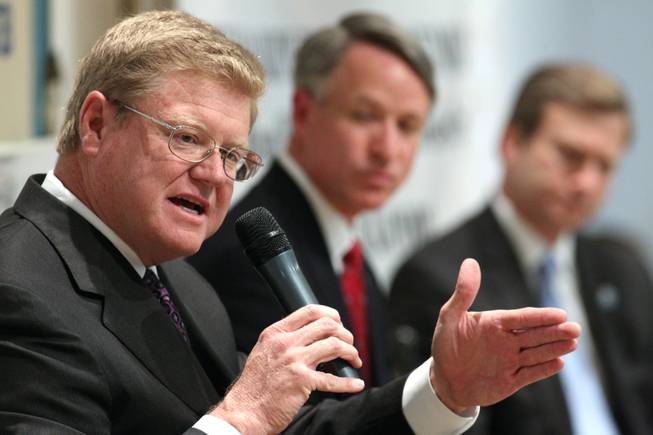
Cathleen Allison / AP
Nevada Republicans, from left, Mark Amodei, Kirk Lippold and Greg Brower debate Wednesday, June 15, 2011, in Reno, Nev. Amodei is now a congressman and represents Nevada’s 2nd District, which includes Reno.
Tuesday, Aug. 5, 2014 | 2 a.m.
In a political climate where getting a single bill passed in Congress can take years, one Nevada lawmaker thinks he’s found a workaround.
Rep. Mark Amodei, a Northern Nevada Republican, has gotten yes votes in the House of Representatives on more than a dozen of his Nevada-related initiatives since April; a feat for any lawmaker.
He has done it in a roundabout way. Amodei sits on the House Appropriations Committee, a powerful committee in Congress that controls the purse strings for 12 federal agencies and their programs.
Congressional gridlock means the first-term lawmaker has found more legislative success working with money than by introducing bills.
The Appropriations Committee in both the House and the Senate are required by law to set spending levels for federal agencies before the fiscal year, beginning Oct. 1. Because of the legal requirement to get these done every year, there’s a better chance lawmakers on appropriations can push through their initiatives.
By contrast, it’s more difficult to get nonspending bills out of other committees, which can be stymied by politics and aren’t on as strict of a deadline.
“This has been a really great way to legislate,” said Amodei’s spokesperson, Brian Baluta.
It’s a great way to legislate because Amodei isn’t legislating, at least not in the traditional sense. Instead of trying to change laws, he’s directing how the federal government can spend its money.
For example, Amodei got language in a spending bill requiring all federal agencies to reconsider holding their conventions in resort cities such as Las Vegas and Reno. (The government has been skittish to travel to Nevada since a scandal erupted in 2012 involving a General Services Administration conference in 2010 in Las Vegas.)
Amodei also pointed Department of Interior money toward wildfire protection, rehabilitation and protecting private water rights — big issues in the northern part of the state.
He even succeeded in getting through the House a one-year delay in the government’s decision on whether to list the sage grouse as an endangered species, which would place restrictions on land that would hurt Nevada’s economy.
Traditional bills Amodei introduced to take similar actions are still stuck in Congress.
“You can’t pass a public lands bill in appropriations, but you can affect a lot of the policy,” Amodei said.
The whole appropriations process takes less than a year. That’s much quicker than the bill-to-law format, which can take three years, as was the case for Amodei’s Nevada Republican colleague, Rep. Joe Heck.
“I’ve never been a money guy, but looking at the opportunity to be there for purposes of that resort language was what enticed us to do it,” Amodei said.
There are downsides. A law is permanent, while an appropriation only lasts a year.
Amodei will have to do all this again next year if he wants another delay on the decision for sage grouse or to keep Las Vegas and Reno back in the running for federal conventions.
But Amodei sees his role on the committee as less of a rule-maker and more of a way to nudge government agencies toward a policy. The prestige of the Appropriations Committee also allows him to meet with top agency officials to press his case.
“You can send out messages very clearly so everyone knows what’s expected,” he said.
The other downside: Ideological and procedural debates have halted Congress’ ability to pass anything, much less spending bills. Congress hasn’t passed a full budget in four years, relying instead on short-term fixes that roll over the past year’s budget without major changes.
In an election year, lawmakers are even less willing to take tough votes on spending bills. That means a short-term fix is likely to happen again, potentially leaving Amodei’s appropriations out of the mix.
So while Amodei may have found a faster way to get things done, all roads in Congress may still lead to gridlock.

Join the Discussion:
Check this out for a full explanation of our conversion to the LiveFyre commenting system and instructions on how to sign up for an account.
Full comments policy